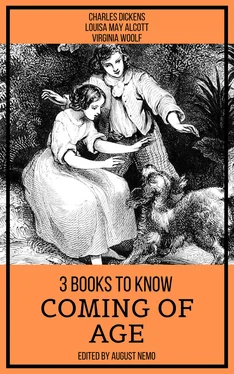Behind the furthest end of the brewery, was a rank garden with an old wall: not so high but that I could struggle up and hold on long enough to look over it, and see that the rank garden was the garden of the house, and that it was overgrown with tangled weeds, but that there was a track upon the green and yellow paths, as if some one sometimes walked there, and that Estella was walking away from me even then. But she seemed to be everywhere. For, when I yielded to the temptation presented by the casks, and began to walk on them. I saw her walking on them at the end of the yard of casks. She had her back towards me, and held her pretty brown hair spread out in her two hands, and never looked round, and passed out of my view directly. So, in the brewery itself—by which I mean the large paved lofty place in which they used to make the beer, and where the brewing utensils still were. When I first went into it, and, rather oppressed by its gloom, stood near the door looking about me, I saw her pass among the extinguished fires, and ascend some light iron stairs, and go out by a gallery high overhead, as if she were going out into the sky.
It was in this place, and at this moment, that a strange thing happened to my fancy. I thought it a strange thing then, and I thought it a stranger thing long afterwards. I turned my eyes—a little dimmed by looking up at the frosty light—towards a great wooden beam in a low nook of the building near me on my right hand, and I saw a figure hanging there by the neck. A figure all in yellow white, with but one shoe to the feet; and it hung so, that I could see that the faded trimmings of the dress were like earthy paper, and that the face was Miss Havisham's, with a movement going over the whole countenance as if she were trying to call to me. In the terror of seeing the figure, and in the terror of being certain that it had not been there a moment before, I at first ran from it, and then ran towards it. And my terror was greatest of all, when I found no figure there.
Nothing less than the frosty light of the cheerful sky, the sight of people passing beyond the bars of the court-yard gate, and the reviving influence of the rest of the bread and meat and beer, would have brought me round. Even with those aids, I might not have come to myself as soon as I did, but that I saw Estella approaching with the keys, to let me out. She would have some fair reason for looking down upon me, I thought, if she saw me frightened; and she would have no fair reason.
She gave me a triumphant glance in passing me, as if she rejoiced that my hands were so coarse and my boots were so thick, and she opened the gate, and stood holding it. I was passing out without looking at her, when she touched me with a taunting hand.
"Why don't you cry?"
"Because I don't want to."
"You do," said she. "You have been crying till you are half blind, and you are near crying again now."
She laughed contemptuously, pushed me out, and locked the gate upon me. I went straight to Mr. Pumblechook's, and was immensely relieved to find him not at home. So, leaving word with the shopman on what day I was wanted at Miss Havisham's again, I set off on the four-mile walk to our forge; pondering, as I went along, on all I had seen, and deeply revolving that I was a common labouring-boy; that my hands were coarse; that my boots were thick; that I had fallen into a despicable habit of calling knaves Jacks; that I was much more ignorant than I had considered myself last night, and generally that I was in a low-lived bad way.
When I reached home, my sister was very curious to know all about Miss Havisham's, and asked a number of questions. And I soon found myself getting heavily bumped from behind in the nape of the neck and the small of the back, and having my face ignominiously shoved against the kitchen wall, because I did not answer those questions at sufficient length.
If a dread of not being understood be hidden in the breasts of other young people to anything like the extent to which it used to be hidden in mine—which I consider probable, as I have no particular reason to suspect myself of having been a monstrosity—it is the key to many reservations. I felt convinced that if I described Miss Havisham's as my eyes had seen it, I should not be understood. Not only that, but I felt convinced that Miss Havisham too would not be understood; and although she was perfectly incomprehensible to me, I entertained an impression that there would be something coarse and treacherous in my dragging her as she really was (to say nothing of Miss Estella) before the contemplation of Mrs. Joe. Consequently, I said as little as I could, and had my face shoved against the kitchen wall.
The worst of it was that that bullying old Pumblechook, preyed upon by a devouring curiosity to be informed of all I had seen and heard, came gaping over in his chaise-cart at tea-time, to have the details divulged to him. And the mere sight of the torment, with his fishy eyes and mouth open, his sandy hair inquisitively on end, and his waistcoat heaving with windy arithmetic, made me vicious in my reticence.
"Well, boy," Uncle Pumblechook began, as soon as he was seated in the chair of honour by the fire. "How did you get on up town?"
I answered, "Pretty well, sir," and my sister shook her fist at me.
"Pretty well?" Mr. Pumblechook repeated. "Pretty well is no answer. Tell us what you mean by pretty well, boy?"
Whitewash on the forehead hardens the brain into a state of obstinacy perhaps. Anyhow, with whitewash from the wall on my forehead, my obstinacy was adamantine. I reflected for some time, and then answered as if I had discovered a new idea, "I mean pretty well."
My sister with an exclamation of impatience was going to fly at me—I had no shadow of defence, for Joe was busy in the forge when Mr. Pumblechook interposed with "No! Don't lose your temper. Leave this lad to me, ma'am; leave this lad to me." Mr. Pumblechook then turned me towards him, as if he were going to cut my hair, and said:
"First (to get our thoughts in order): Forty-three pence?"
I calculated the consequences of replying "Four Hundred Pound," and finding them against me, went as near the answer as I could—which was somewhere about eightpence off. Mr. Pumblechook then put me through my pence-table from "twelve pence make one shilling," up to "forty pence make three and fourpence," and then triumphantly demanded, as if he had done for me, "Now! How much is forty-three pence?" To which I replied, after a long interval of reflection, "I don't know." And I was so aggravated that I almost doubt if I did know.
Mr. Pumblechook worked his head like a screw to screw it out of me, and said, "Is forty-three pence seven and sixpence three fardens, for instance?"
"Yes!" said I. And although my sister instantly boxed my ears, it was highly gratifying to me to see that the answer spoilt his joke, and brought him to a dead stop.
"Boy! What like is Miss Havisham?" Mr. Pumblechook began again when he had recovered; folding his arms tight on his chest and applying the screw.
"Very tall and dark," I told him.
"Is she, uncle?" asked my sister.
Mr. Pumblechook winked assent; from which I at once inferred that he had never seen Miss Havisham, for she was nothing of the kind.
"Good!" said Mr. Pumblechook conceitedly. ("This is the way to have him! We are beginning to hold our own, I think, Mum?")
"I am sure, uncle," returned Mrs. Joe, "I wish you had him always: you know so well how to deal with him."
"Now, boy! What was she a-doing of, when you went in today?" asked Mr. Pumblechook.
"She was sitting," I answered, "in a black velvet coach."
Mr. Pumblechook and Mrs. Joe stared at one another—as they well might—and both repeated, "In a black velvet coach?"
Читать дальше












